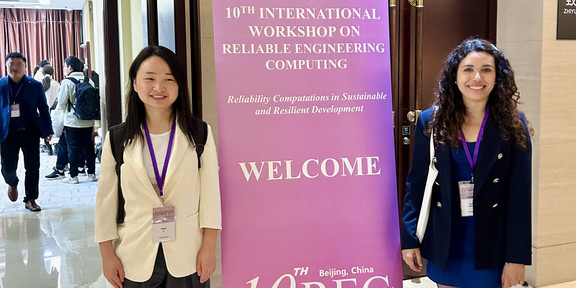REC 2024 Highlights: CRE’s contributions in Beijing

From October 26-27, 2024, members of the Chair for Reliability Engineering (CRE) participated in the 10th International Workshop on Reliable Engineering Computing (REC2024), held at Beijing University, China which was held by Tsinghua University. Dr. Peipei Li and Nataly Manque Roa represented the Chair and presented their research in the field of uncertainty in mechanical systems and sustainable engineering solutions.
The theme of REC2024 was “Reliability Computations in Sustainable and Resilient Development.” The workshop served as a multidisciplinary forum for engineers and scientists from academic, industrial, and governmental institutions to discuss recent developments and future challenges in risk and uncertainty methodologies. The conference included knowledge-sharing sessions, focusing on the role of reliability computations in advancing sustainable and resilient engineering practices.
Dr. Peipei Li’s Research:
Direct updating of the overall failure probability using the weighted sparse grid numerical integration
Abstract:
Bayesian updating is widely used for reliability evaluation of deteriorating structures, but it requires significant computational effort as structural reliability analysis must be repeated with each new inspection update. To address this, this study proposes an efficient method to directly update the overall failure probability using an updating factor, which separates new information from prior reliability analysis. This approach eliminates the need for repeated full-scale evaluations. Additionally, weighted sparse grid numerical integration is employed to update only representative points of the updating factor, significantly reducing computational cost. The accuracy and effectiveness of the proposed method are validated through numerical comparisons with Markov chain Monte Carlo simulations.
Nataly Manque Roa’s Research:
Isogeometric Analysis for Coping with Geometric Uncertainty in Mechanical Systems
Abstract:
Geometric uncertainty in industrial manufacturing can create significant discrepancies between numerical simulations and real-world system behavior. Traditional finite element (FE) methods struggle with computational costs when addressing these uncertainties, especially in the early design stages. This study explores the potential of Isogeometric Analysis (IGA) for handling geometric uncertainties defined by intervals. By leveraging Non-Uniform Rational B-Splines (NURBS), IGA enhances geometric manipulation and enables efficient sensitivity calculations. A variational formulation is applied for simultaneous structural response and sensitivity computation, supporting gradient-based optimization in interval analysis. The proposed approach is tested on a linear hook system, demonstrating its effectiveness in estimating uncertain stress triaxiality.
As CRE continues to contribute in this field, we remain dedicated to advancing research that bridges theoretical innovation with practical applications. We look forward to further collaborations and opportunities for ensuring safer, more efficient, and sustainable systems worldwide.
Conference details sourced from http://rec2024.com/








